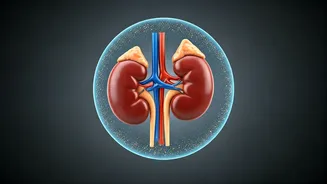Stay Hydrated Daily
Adequate hydration is a cornerstone of kidney health. The kidneys play a vital role in filtering waste and toxins from the blood, a process that relies
heavily on sufficient fluid intake. Dehydration can impair this crucial function, leading to a buildup of waste products and potential damage. Aim to drink water consistently throughout the day, and pay attention to your body's signals of thirst. The amount of water needed varies from person to person, so consider factors like activity level and climate. Staying well-hydrated helps the kidneys work efficiently and reduces the risk of kidney-related problems. This simple yet critical habit can have a significant positive impact on your overall health.
Manage Sodium Intake
Excessive salt consumption can elevate blood pressure, putting undue stress on the kidneys. High blood pressure is a significant risk factor for kidney disease, as it damages the delicate blood vessels within the kidneys. Reducing sodium intake is a proactive measure to protect your kidneys. Be mindful of processed foods, which often contain high levels of hidden sodium. Prepare meals at home more often, allowing you to control the amount of salt used in cooking. When eating out, request that your food be prepared with less salt. Reading food labels carefully can also help you make informed choices, selecting products that are lower in sodium. A conscious effort to moderate salt intake is a vital step in maintaining healthy blood pressure and preserving kidney function.
Maintain Healthy Weight
Maintaining a healthy weight is essential for overall health and, in particular, kidney function. Obesity can increase the risk of developing several health problems, including diabetes and high blood pressure, both of which are major contributors to kidney disease. Excess weight can also directly strain the kidneys, making them work harder. Regular physical activity and a balanced diet are key components of weight management. Aim for a mix of cardiovascular exercises and strength training to build muscle and burn calories. Prioritize whole, unprocessed foods, such as fruits, vegetables, and lean proteins, while limiting your intake of sugary drinks and unhealthy fats. By achieving and maintaining a healthy weight, you can reduce your risk of kidney disease and improve your overall well-being.
Control Blood Sugar Levels
Diabetes is a leading cause of kidney disease, making effective blood sugar management crucial for kidney health. Elevated blood sugar levels can damage the tiny blood vessels in the kidneys, hindering their ability to filter blood properly. If you have diabetes, consistent monitoring of your blood sugar levels is essential. Work closely with your healthcare provider to develop a personalized treatment plan that may include medication, diet modifications, and regular exercise. Regular check-ups and screenings for kidney complications are vital if you are diabetic. Following your healthcare provider's recommendations for managing your diabetes will significantly reduce your risk of developing kidney disease and maintaining kidney health for a longer period.
Regular Medical Checkups
Regular check-ups are essential for detecting kidney problems early. Kidney disease often has no symptoms in its early stages, making routine screenings vital. During these check-ups, your doctor can assess your kidney function through blood and urine tests. They can also monitor your blood pressure and look for any signs of related health issues. Early detection enables timely intervention and treatment, which can slow the progression of kidney disease and prevent complications. Discuss your family history of kidney disease with your doctor, as this can increase your risk. Make preventive care a priority to stay ahead of potential issues. These regular check-ups offer valuable opportunities to discuss any health concerns and receive personalized advice for maintaining kidney health.
Control Blood Pressure
High blood pressure is one of the most common causes of kidney disease, therefore, controlling blood pressure is imperative. High blood pressure can damage the blood vessels in the kidneys, hindering their ability to filter blood efficiently. If you have high blood pressure, take steps to manage it, with your doctor's guidance. This may involve medication, dietary changes, and regular exercise. Regular monitoring of your blood pressure at home can also help you keep track of your progress and make necessary adjustments to your lifestyle or medication regimen. Follow your doctor's advice and take your medications as prescribed. Manage stress through relaxation techniques and get enough sleep. Maintaining healthy blood pressure is an important step in preserving kidney function and reducing the risk of kidney disease.













